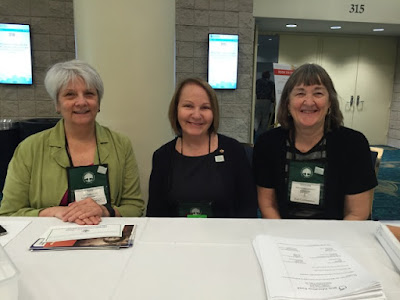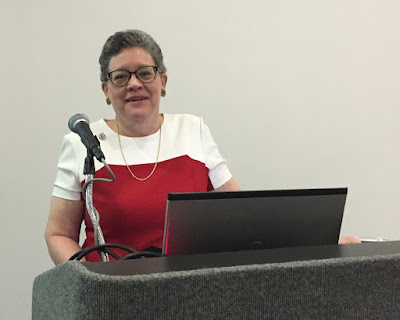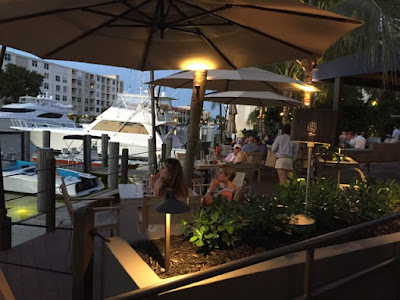While it may have seemed
quiet here at my blog the past few weeks, real life has been anything but. I
went from the Ohio Genealogical Society Conference in Cincinnati from April
28-30 to the National Genealogical Society Conference in Fort Lauderdale from
May 3-7, then spent a week on vacation at the beach with my family. If there's one thing I've learned, it's that experiencing
things to their fullest often doesn't leave much time for writing. Happily, I'm now able to offer a brief recap of NGS 2016, which I plan to post in two parts.
I arrived in Fort Lauderdale a
day early to attend Tuesday’s “Putting Skills to Work” workshop sponsored by
the Board for Certification of Genealogists (BCG) Education Fund. Several of us
ended up walking all the way around the exterior of the conference complex before finding an open door,
so I was a bit harried when I finally arrived at the right place. It was a
pleasure, then, to be greeted by three friendly BCG associates at the reception
desk. This was my first time attending a BCG workshop, and it
was every bit as helpful and informative as I hoped it’d be.
 |
| BCG Workshop registration with Sara Scribner, CG, Stefani Evans, CG, and Melinda Henningfield, CG |
My morning workshop was
“Spreadsheets 201: Manipulating Data to Dismantle Brick Walls,” presented by
Jeanne Larzalere Bloom. It was illuminating to see the types of spreadsheets
Jeanne creates and the various ways she sorts data to draw comparisons. The
classroom setting and extended time gave her a chance to really get into the
subject. Three takeaways from this workshop were:
- In addition to logging research, spreadsheets are also a powerful tool for correlating information
- Break data down into small pieces for easy manipulation (for example, use separate columns for first and last names)
- Color coding is a great visual tool for identifying patterns and similarities
 |
| Jeanne Larzalere Bloom, CG |
In the afternoon I learned to
“Reach for the Power Tools: Transcriptions & Abstractions” with David
McDonald. In this workshop, we transcribed documents from
various time periods, learned to strike out unnecessary verbiage, made
abstracts, and considered what research questions the documents suggested. The
time went fast. Three takeaways were:
- Exact means exact—every mark on a document must be noted in a transcription
- Study other records from the same time and place to judge what is boilerplate and what is not for your abstract
- This is more art than science, and practice helps
 |
| David McDonald, D.Min., CG |
By the time the workshops
concluded, conference registration was open and people were starting to pick up
their materials for the next day.
The conference opened bright and early on Wednesday, May 4. Keynote speaker Connie Lester spoke
about some lesser-known figures in Florida’s past. She’s working to preserve
and improve access to Florida social history sources with a digital initiative
called RICHES. Since social history plays a big role in learning about our
ancestors’ lives, I think this is a great program.
The exhibit hall opened at
9:30 am. As sessions weren't scheduled until 11:00, most people took
the opportunity to make a first pass through the vendor booths. There's been some discussion about attendance and exhibit hall traffic at NGS 2016. Here's my observations, for what they're worth:
PROS:
- There were a good mix of vendors, with genealogical institutes, societies, magazines, podcasts, software developers, and more well represented
- Ancestry, FamilySearch, MyHeritage, and FindMyPast all had large displays with special programming
- A space was set aside in the back for social media use and interviewing
- The BCG Certification booth was consistently busy with people looking at portfolios
CONS:
- The exhibit hall was unfortunately located on the first floor, far away from the lecture rooms on the third floor, making it impractical to visit the exhibits during the 30-minute session breaks
- It was missing a big bookstore vendor (such as Maia's Books) to draw people in
- The food concession had a very limited menu and long wait, so a lot of people went off-site for lunch, meaning less traffic for vendors
- The three biggest vendors (Ancestry, FamilySearch, and MyHeritage) were all right up front as people came in, so the buzz was concentrated there rather than being distributed throughout the hall
Hourly sessions began at
11:00, with ten lectures per session. That’s a lot of choices, and most of the time I was torn between two, three, or even four lectures. To kick things off, I chose “When
Worlds Collide: Resolving Conflicts in Genealogical Records” with Judy Russell.
I’m glad I did. Judy spoke about different methods to deal with conflicting
evidence in order to reach a credible conclusion. Her lecture, like most
others, is available for purchase from PlaybackNGS, and I highly recommend it.
 |
| Judy Russell, CG, aka The Legal Genealogist |
After lunch, I attended “A
New Document! Now What?” presented by J. Mark Lowe. I’ve heard Mark talk about
research planning before, but find I always pick up something new because good
speakers are continually updating their presentations. Besides, I’m in a
different place, learning-wise, than I was three or four years ago. One
takeaway from this lecture is that the more specific your research question
is, and the more specific your plan is, the greater your chance of success.
I finished the day with Gail
Miller’s “Developing a Successful and Efficient Research Plan.” While the
description of her lecture sounded similar to Mark’s, in fact it complemented
it well. I liked Gail's emphasis on knowing all about the locality you’re working
with before you even attempt to develop a research plan. I also appreciated her
advice to literally lay everything
you currently have on a problem (including a map) out in front of you, then ask
yourself what’s missing.
 |
| J. Mark Lowe, CG, Linda McCauley, and Gail Miller, CG |
After a full day, it’s always
nice to go out for dinner with colleagues and friends—especially when the view
from the restaurant involves palm trees and water.
I enjoyed meeting many of my blog readers at NGS 2016, and hope you all had as much fun as much as I did. I'd love to hear your thoughts or comments about the conference. Stay
tuned for Part 2 shortly...
--Shelley





